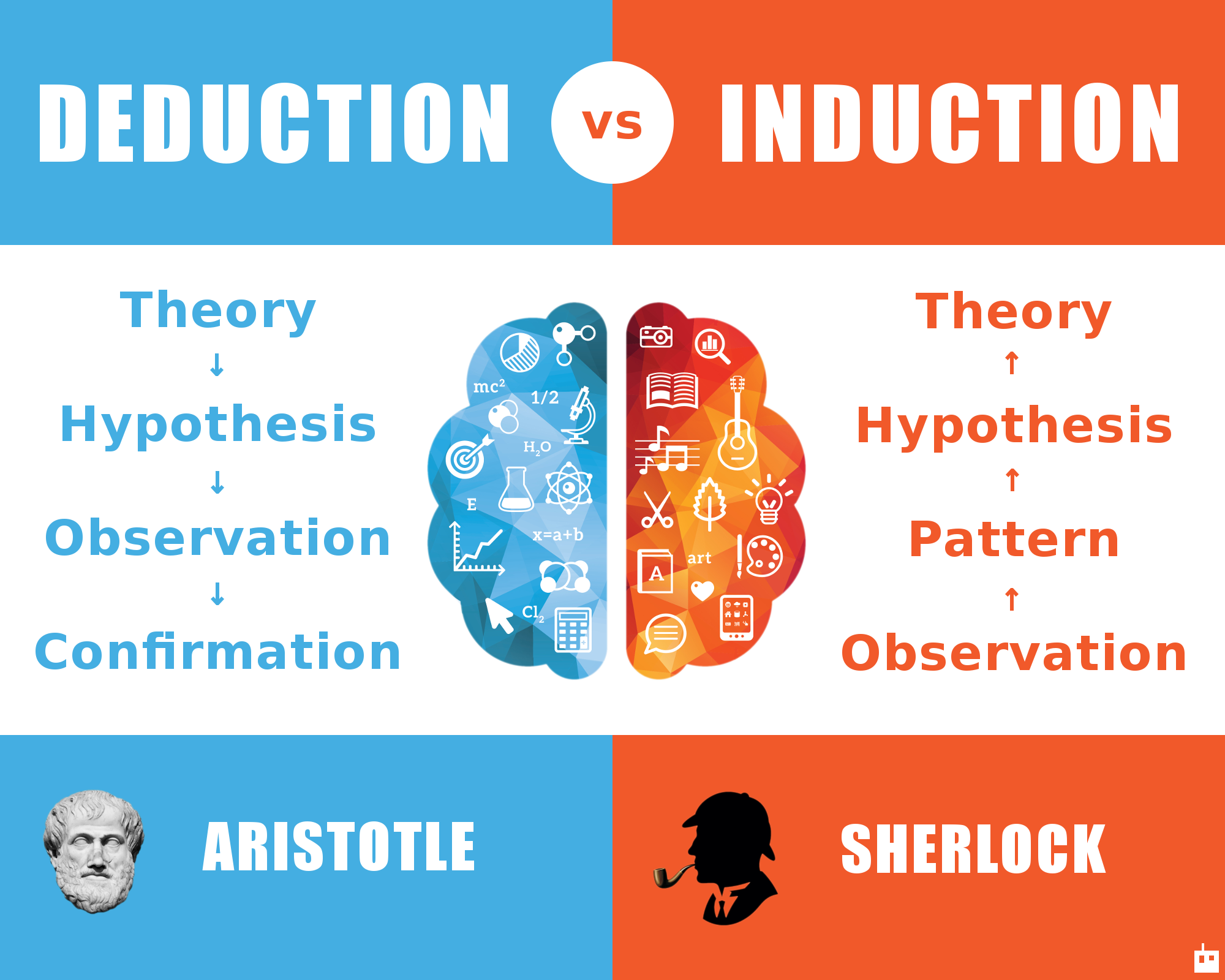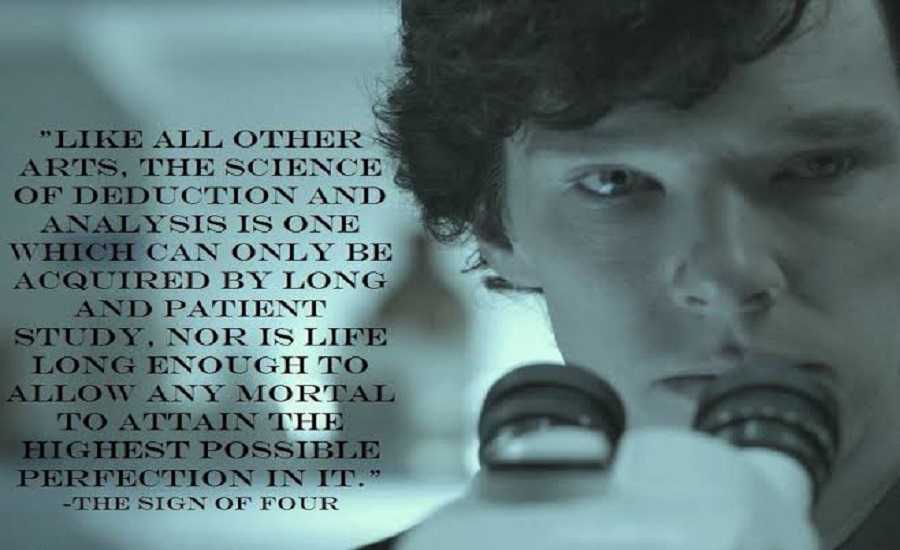The science of Deduction
We also call science of deduction as the art of deduction. It is a kind of logical thinking. In usual language, we call the science of deduction as Deductive reasoning or Deduction. It gets widely implemented in many kinds of organizations and valued by employers to reach a specific conclusion.
It starts with a general idea, a general statement or hypothesis—sometimes called a premise — believed to be true.
- The premise is used to reach a specific, logical conclusion.
- This hypothesis and theories get made initially as a major premise.
- Starting from the general theory and reaching to the specific observations, prediction is made about what the observations should be, if the theory/hypothesis were correct.
- The predictions are the inferences.
The most common example of Science of deduction is- ‘If A = B and B = C, then C = A’.
- If the Mass of an Apple is equal to the Mass of a mango, and the Mass of this mango is equal to the Mass of a pear, then the Mass of that Apple is also equal to the Mass of this pear.
For deductive reasoning to be reliable, the hypothesis must be correct. It is possible to be true if the hypothesis is wrong, but not always. Because, if the generalization is wrong, the conclusion may be logical, but it may also be untrue.
For example- Let’s say, “All moms are house makers. Tisha is a mom. Hence, Tisha is a House maker.”
This might be valid if we look at it as three logical statements. But since the original/general statement or hypothesis “All moms are house makers” is wrong, then the inference or the conclusion “Tisha is a house maker” is also wrong.
Therefore, science of deduction is not merely dependent on a single thing. It is not just a method or technique based on deductive reasoning, but is nuanced. It notices the subtle differences in things. Everything is not black or white in deduction. Deduction includes considering all possibilities and looking at the finer details.
Our mindset is the key over method and the pre-set of techniques. We render technique and methods useless without a mindset strong or skilled enough to apply them in unusual situations because any situation is never 100 percent the same. Even the minute details can cause a great deal of difference.
There are two other kinds of logical reasonings- Inductive reasoning and abductive reasoning.
Inductive reasoning is the opposite of deductive reasoning. In inductive reasoning, we go through a pre-set of data or specific observation to figure out some general information. In inductive method, there is a gathering of evidence, seeking patterns, and forming a hypothesis or theory to explain what we see.
Inductive reasoning is based on the pre-set of observations and deductive reasoning is based on hypothesis created after observing the things for the first time.

Inductive reasoning helps in the scientific method. Scientists use it to form hypotheses and theories. Deductive reasoning allows them to apply the theories to specific situations.
Abductive reasoning is making the best attempt possible to reach to a conclusion using the best usable information available. Abductive reasoning begins with an incomplete set of observations and proceeds with the most probable or likely explanation for the observations.
- Abductive reasoning is useful for forming hypotheses to get tested. Abductive reasoning is often used by doctors who make a diagnosis based on test results and by jurors who decide based on the evidence presented to them.
The application of both the inductive and abductive reasonings can also flow into the applications of deductive reasonings. Ideally, we should use the three in combinations for correct conclusions. Everything depends upon the situations and events.
The usage of only a single reasoning method by a person would reflect that the mindset of that person sees things as absolute and the person lacks perspective. On the other hand, the use of combinations of the three is most likely to lead to a just conclusion.
People believe it to be the science of induction or the science of deduction, but Sherlock Holmes used them in combinations. The character is fictional, but the science of induction and deduction used by combinedly in solving his cases is not fake science.
The science of deduction needs attention, focus and presence of mind to reach to any correct inferences. There is a need of a great deal of practice and study. The study begins with the study of self. Introspection is a must before extrospection and retrospection.
The process of deduction involves a deep and complete observation of the situation, person, thing or environment. The observation skills play the most important role while observing a whole new thing which we have never come across before. After that, knowledge about things comes into play.
But this does not mean stacking-up of unnecessary data present before us. This will lead to countless useless theories. The important data need to get filtered out of the pool of information. With practice comes the knowledge of what is important, why it is important, and when to use it.
After gathering information to form basic theories, there is a need of in-depth study of the things related to the subject of deduction. The detail can be very minute. After forming the theories, we do the test as per our mindset, skills, practice, available knowledge, further observations.
Colin Cloud got inspired by the works of Arthur Conan Doyle and became a deductionist. Arthur is the one who created the character of Sherlock Holmes and the stories. Colin has been studying the art of deduction since childhood and got accepted into a university program in a forensic investigation at the early age of 15.
How is the science of deduction valuable in everyday life?
- In the corporate world, we can read our employers, employees or colleagues and behave according to what is best suitable for our healthy survival.
- We can provide logical reasons for our actions, decisions, tasks, pitches, etc.
- In social life, we can access people, situations and societies which help us understand their situations, characters, environment and decide about our actions accordingly.
Example–
An advertising manager of a firm comes to know that the department of social media advertising is more effective than the department of direct advertising, that is Email and SMS advertising by analysing the quantitative information provided by the departmental analytics.
He calls the department manager and asks him to fire the incompetent staff from direct advertising because they were less experienced and did not have a master’s degree and asked him to hire more qualified professionals.
- Before agreeing and talking action in this matter, the department manager himself analyses the marketing patterns, the copy and the marketing staff, and makes an assessment that allows him to conclude that the staff of the direct marketing staff is not working up to the mark because he observed that the same employees were working just fine about a month ago.
- He analysed the staff further- when do they come, how do they talk, what and how do they eat, their facial expressions, conversations, marketing content, clothes, punctuality, etc. and then infers that something is not right in the personal life of three of the employees of the department.
- So, decides plans an effective style of approach to talk to them about their personal and professional problems in order to solve the problem of inefficiency of the department.
- The results were positive. The employees got impressed at the fact that their boss is concerned about his employees and will help them. The motivation and support boosted the enthusiasm of the employees, which finally provided with more effective results than ever before. The employees were now happy.
- This saved a lot of money, time, contracts and opportunities for the firm and proved beneficial for the managerial record of the departmental manager himself.
Living and working logically and reasonably is always effective and just. Being impulsive and rigid is not an ideal formula to succeed and live happily in our lives. The world is vast with very minute details.
Observe our everyday surroundings, people, environment starting right from ourselves. We shall grab every opportunity to observe and react accordingly, to reach to the deepest of details and form highly correct inferences.
To understand deeply about the Science of deduction, visit the official websites of deductionists.
Colin Cloud and The art of deductive reasoning.
Note: Deduction is not the reading of another’s mind, but the reading of visible and secret physicality.

I never knew something like this existed in real life!